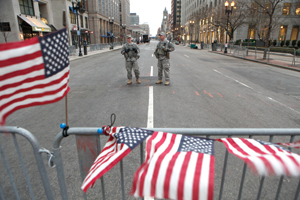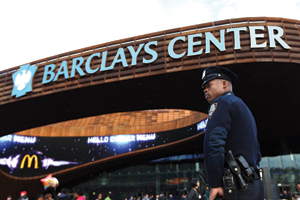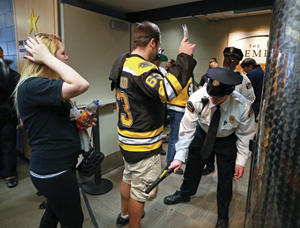
Mary Wittenberg, CEO of New York Road Runners, stared at her phone in disbelief, having left the finish line of the Boston Marathon to hop a train back to New York an hour earlier. The screen had just two sentences on it.
“Our greatest nightmare has happened. Two explosions at the finish line.”
 |
Photo by: GETTY IMAGES
|
For more than a decade, U.S. sporting events avoided being drawn into the war on terror. That changed last week in Boston, and it’s a nightmare that will have an immediate and permanent effect on U.S. sporting events.
The 9/11 attacks a dozen years earlier led to an unprecedented overhaul of security at sports venues across the country. Over time, changes ranged from disallowing bags at Yankee Stadium to wanding fans at NFL games.
Last week’s attacks sparked similar changes, from emergency security meetings in Long Beach ahead of the IndyCar Grand Prix, to the Nashville Predators bringing in bomb-sniffing dogs, to even Wittenberg’s New York Road Runners making participants at Sunday’s City Parks Foundation Run store extra clothing in clear, plastic bags instead of the usual backpacks and duffel bags.
Security experts and sports executives say that’s only the beginning.
In the coming years, they expect to see security bolstered not only at sports facilities but also at ancillary events like concerts, fan festivals and endurance competitions that make for “soft,” or easily accessible, targets. Teams will spend more on security personnel; sponsors and organizers will see insurance premiums rise; counterterrorism intelligence and analysis around large and small events alike will become more of a priority; spectators will be called on to assist with surveillance; and law enforcement officials and private security operators will have to recalibrate their approach to events.
“This incident in Boston is a reminder, a wake-up call,” said John Power, director of security at International Speedway Corp., which owns Daytona International Speedway and 11 other racetracks. “It lets us know that just because some time has passed, we’re still vulnerable and the threats are still there. It’s going to get us all thinking and looking at the security measures enacted after 9/11 back at the forefront of our minds.”
Security officials across teams, leagues and facilities said the Boston attack won’t cause major changes to their security measures. They all have the advantage of securing well-defined, enclosed venues that can be protected with measures ranging from spectator wanding, which all NFL teams adopted last year, to establishing 100-foot perimeters to prevent explosive devices from being driven into the area.
But the Boston attack underscored that security is no longer just about protecting the venue.
“The problem with open-air events is that they are like a balloon — you squeeze it and you just displace the threat to somewhere else,” said Brian Finch, partner in the Government Law and Strategy Group at Dickstein Shapiro.
Officials now need to consider how they and local authorities protect and secure potential targets outside their venues. Ancillary events ranging from free concerts to fan festivals have multiplied over the last decade as sports organizations and sponsors have tried to reach more fans. Many of those events don’t have the same level of security procedures and processes as the games they’re affiliated with, such as the NCAA Final Four or the Super Bowl.
“The live site, the public area, is going to be under greater scrutiny because we’re providing an opportunity there for people to do bad things,” said Dan Donovan, a security consultant at Guideposts Solutions who worked on security plans for the Athens and Beijing Olympics. “Whether it’s the Final Four or the Olympics or Indianapolis for the Super Bowl, it’s creating an opportunity. Each time [attacks like Boston happen] these things get assessed, and in that assessment process they’re going to say, ‘Hey, you can have a live site, but we’re going to require screening and random bag checks.’ That’s going to be up to the local authorities.”
 |
Heightened security was in place at sporting events last week, including police officers at the Barclays Center for a Brooklyn Nets game and wanding of fans at a Boston Bruins game.
Photos by: GETTY IMAGES
|
Adopting those types of security measures has the potential to increase security costs across sports. Teams, leagues and government organizations already spend an estimated $2 billion on security in the U.S., according to ESPN, and those costs have ballooned since 9/11. Nothing exemplifies that better than the Olympics, which went from spending $500 million on security in 2002 to $1.5 billion in 2012.
Additional security personnel remain the best option for improving security, but they come at a cost. Private security guards demand $15 to $20 an hour and law enforcement officials get $30 to $75 an hour. There’s also new
technologies that event operators can buy, ranging from wireless surveillance cameras to VidSys software, which Houston used during the 2011 NCAA Final Four to improve interagency cooperation.
Some of those costs will be borne by leagues and teams, but the bulk will fall on the government. Ray Mey, who worked for the FBI for 23 years and served as the agency’s counterterrorism liaison for the 2002 Salt Lake City Games, expects cities to begin asking whether they should host events and many to begin looking to the federal government to cover security costs.
“It’s not going to be the city [that bears the cost],” said Mey, a senior program manager of The Soufan Group, which is a security consultancy on Madrid’s bid for the 2020 Olympics. “In most cases, a senator or congressman from a particular state will say an event is coming like the America’s Cup in San Francisco this summer, and they will try to leverage political capital to bring resources to the state. It gets awfully expensive.”
Many teams have anticipated the rise in security costs over the last decade and tried to control those increases through smart stadium designs. Donovan, who is consulting with the San Francisco 49ers on their new stadium in Santa Clara, said the building was designed so that the team can add security measures at a minimal cost.
“New stadium owners and architects are making sure that what they design today is ready for the problems and larger events they’ll have tomorrow,” Donovan said, adding that can range from installing camera systems to being prepared to have the 300-foot perimeter that the NFL requires to host the Super Bowl.
Promoters also worry about what the Boston bombing will do to the cost of insurance premiums for ancillary events. Vince Thompson, CEO of Melt, an Atlanta-based sports and event marketing agency, said there’s only a small group of insurance companies that even offer the kind of liability and terrorism insurance he needs to run concerts and fan fests in conjunction with sporting events.
“Ever since 9/11, the whole landscape for security measures has dramatically shifted,” Thompson said. “You’re talking about only a very select group of commercial underwriters out there, and you’re going to face excessive scrutiny by the underwriters as they assess risk. All of that impacts the premium, and the premium impacts the price of a ticket.”
Any type of event that will attract a crowd of 10,000 to 15,000 or more can require at least $10 million in insurance coverage. Melt in the past has produced concerts, including some for its client, Coca-Cola, that have attracted crowds of 50,000-plus. Those events require liability insurance with an umbrella policy that includes attacks and acts of terrorism, and premiums for that kind of insurance can annually run well into the five figures, Thompson said.
“The footprint of a sporting event has expanded far beyond the stadium,” he said. “It’s now about a 2.5 multiple. If you’ve got 80,000 people attending a Final Four, you’ve got another 150,000 to 200,000 fans congregating in that area. At the Final Four, you’ve got to take into account the Big Dance, Bracket Town. And basically you’re talking about metal detectors, so it’s very rudimentary security.
“You almost need to put something like airport security against this. But at the same time, you have to make sure you don’t inconvenience the fans to the point where they don’t show up.”
Thompson wasn’t the only one to raise the idea of bringing airport security measures to sports events. But more than the security measures, event organizers and security officials said they would like to see sports push fans to be as vigilant at events as they are when they fly.
Jim Birrell, managing partner of Medalist Sports, which oversees operations for cycling events, said next month’s Amgen Tour of California will employ a “See Something, Say Something” campaign with banners and T-shirts. Others raised the idea of having public-service announcements similar to the ones made at airports, reminding people to report abandoned bags and suspicious behavior.
Some teams are already taking steps to do that. The San Francisco Giants have a texting system that allows fans to anonymously report unusual activities at AT&T Park.
“Everyone who goes to an event has some responsibility,” said Doug Arnot, London 2012’s director of Games operations. “I suspect we’ll see more talk about what you can bring to an event. You will see an intense public awareness, an encouragement of public participation and cooperation.”
But it will take more than just increased spectator vigilance to prevent another attack like the one in Boston. To do that, security experts said that the government, both federal and local, will need to improve counterintelligence and security analysis of future sports events.
Mey said that the fusion centers, which gather counterintelligence information and act as a liaison between local and national public safety groups, should begin looking at local sports events and evaluating their preparedness. In the case of the Boston Marathon, they could have determined whether the 26-mile route could be rerouted to avoid potential vulnerable areas, they could have reviewed all the participants to see whether anyone had animosity toward the United States, and they could have noted that it was Patriots’ Day, Tax Day and close to the anniversary of the 1995 Oklahoma City bombing.
“They could have said, ‘This cumulative threat picture forces us to believe this event is elevated to a heightened level of threat and as a result we recommend you do X, Y and Z,’” Mey said.
Bill Rathburn, former chief of police in Dallas and deputy chief of police in Los Angeles, who served as the director of security for the 1996 Atlanta Olympics, said he expects local law enforcement to shift their approach at large-scale events, as well. In the case of many large sporting events, law enforcement officials are more focused on traffic and public safety than surveillance. He expects every police chief to make a more deliberate assessment of threats during future sports events and encourage their police force to be vigilant in watching for potential “bad guys” around the event.
“With events that run annually or periodically, there’s an attitude of everything-is-going-as-usual,” Rathburn said. “That will change.”
Both Mey and Rathburn raised the possibility that the federal government might revisit the way it classifies sporting events for potential attacks. Following 9/11, Washington began declaring top sporting events like the Super Bowl and Olympics “National Security Special Events.” Below that level, there are four levels of Special Event Assessment Rating, ranging from Level 1, which is a high threat level that demands significant federal support, to Level 4, which is a minimal threat level and requires no federal support.
Major marathons such as Boston have been typically designated a Level 2 event, although sources within the Department of Homeland Security and the FBI say that level of protection could change in the future, and Mey and Rathburn argued that it should.
“More events will get risen to that [National Security Special Event] level, but the problem is where do you draw the line?” Mey said. “I can guarantee you that before this event happened the FBI’s mantra is that there are no known terrorist threats to the event. How do you sell that?”
There’s already evidence that federal agencies are taking more of an interest in sports events. The Competitor Group, which operates the Rock ’n’ Roll Marathon Series, for the first time is working with the FBI ahead of its race this weekend in Nashville. The marathon is the first big one in the U.S. since Boston, and in addition to working with the FBI, it is installing cameras at the finish line.
But Competitor Group CEO Scott Dickey wants everyone to know that Boston wasn’t an epiphany. Security has always been an issue for sports events, and it always will be.
“We live in a post-9/11 world, not a post-Patriots’ Day world,” he said. “This is not a new issue.”
David Broughton, Fred Dreier, Eric Fisher, Daniel Kaplan, Don Muret, John Ourand and Michael Smith contributed to this story.






